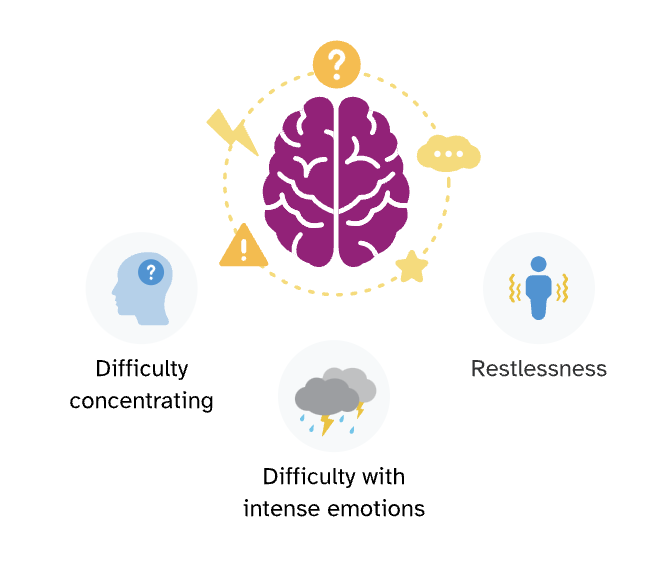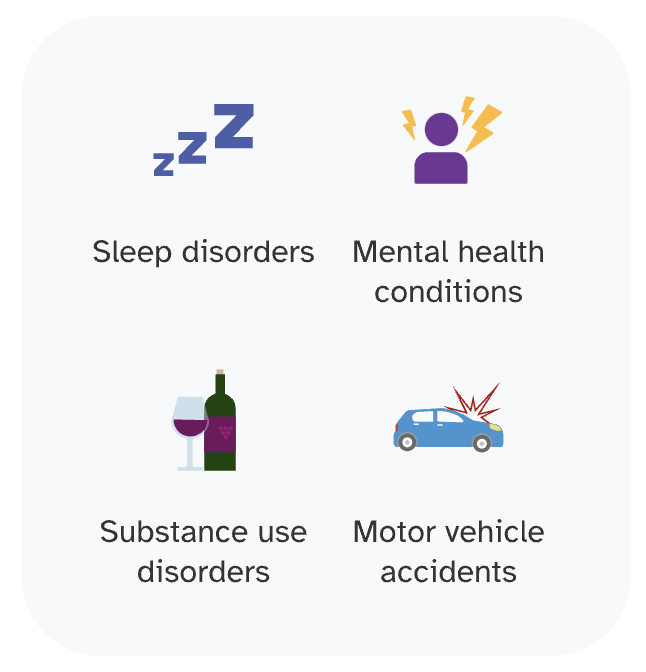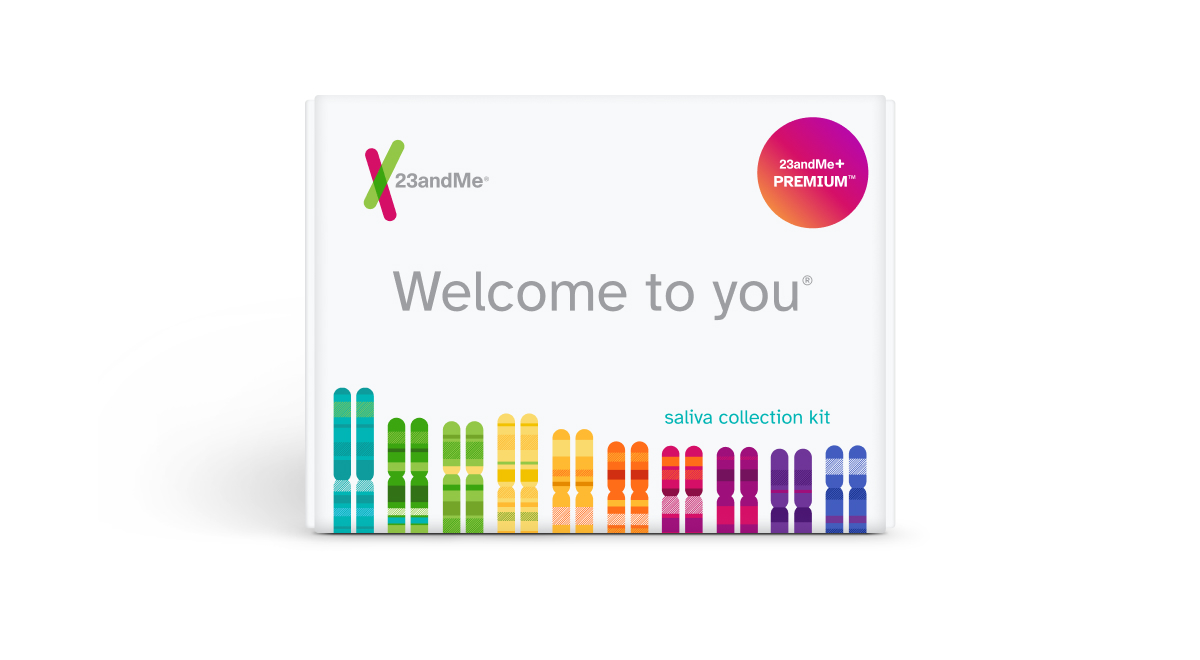Is ADHD Genetic?Explore ADHD and what your DNA can tell you
What is ADHD?
ADHD can affect attention, working memory, or executive function, which is the brain’s ability to prioritize and manage thoughts and behaviors. ADHD affects people differently, which can make recognizing it a challenge. People with ADHD may experience things like:
- Difficulty concentrating
- Difficulty coping with intense emotions
- Feeling restless
- Difficulty completing tasks or projects
- Frequently losing things
- Forgetfulness
While everyone can sometimes experience these things to different degrees, for people with ADHD these characteristics tend to persist over time and can impact school activities, work, or relationships.
For all individuals, genetic testing is available to identify variants linked to the different types of ADHD. Additional genetic factors may be discovered in the future.

Health conditions associated with ADHD
People with ADHD may be more likely to experience:
- Sleep disorders like insomnia, restless legs syndrome, and sleep apnea
- Mental health conditions, including anxiety, depression, and eating disorders
- Substance use disorders
- Motor vehicle accidents (due to difficulty concentrating while driving)
While associated health conditions may be improved with a management plan for ADHD, they may also need to be addressed separately to support overall health.

ADHD and well-being
While medical research can tend to focus on negative impacts and treatments for ADHD, many people with ADHD find that these impacts can be related to external standards imposed by society, rather than being inherent to having ADHD. Finding ways of adapting schools, workplaces, and other institutions to fit the people within them can promote acceptance of differences and reduce the challenges associated with ADHD.
Recent studies focusing on the perspectives of individuals with ADHD show that a majority of people report experiencing positive impacts too. Commonly reported positive aspects include things like drive, adventurousness, creativity, flexibility, hyperfocus, and a willingness to assist others.

Is ADHD genetic?
Genetics do play a role in ADHD. This means some people may be more likely to have ADHD than others, depending on their genetics. ADHD can run in families, which means that a person has an increased chance of having ADHD if family members have the condition. In most cases, it is a combination of many different genetic variants that impact a person’s chances of having ADHD. Individually, each of these variants only has a small impact on a person’s genetic likelihood, but that impact can grow when many variants are considered together. 23andMe takes into account 15,217 genetic markers to estimate the likelihood of having been diagnosed with ADHD.
Find out if your genetics might increase your likelihood of developing ADHD
Curious whether you have an increased likelihood of having ADHD based on your genetics? Find out more with the Attention-Deficit/Hyperactivity Disorder (ADHD) report (Powered by 23andMe Research), part of the 23andMe+ Premium membership. 23andMe+ Premium includes our Health + Ancestry Service plus new premium reports and features throughout the year.

23andMe+ Premium
Please note:
- This report does not diagnose ADHD and should not be used to make medical decisions.
- The report was developed by 23andMe scientists using data and insights gathered from thousands of customers who consent to participate in our research. Reports based on 23andMe research provide an estimate of your likelihood of having been diagnosed with a condition based on your genetics and other factors. This report does not account for lifestyle or family history.
- The report does not account for every possible genetic variant that could affect your likelihood of having ADHD.
References:
- ADDittude. “What Is ADHD? Attention Deficit Hyperactivity Disorder in Children and Adults.” Retrieved January 13, 2023, from https://www.additudemag.com/what-is-adhd-symptoms-causes-treatments/.
- Aduen PA et al. (2018). “ADHD, depression, and motor vehicle crashes: A prospective cohort study of continuously-monitored, real-world driving.” J Psychiatr Res. 101:42-49.
- CHADD. “About ADHD – Overview.” Retrieved January 13, 2023, from https://chadd.org/about-adhd/overview/.
- Fuller-Thomson E et al. (2022). “Attention-Deficit/Hyperactivity Disorder and Alcohol and Other Substance Use Disorders in Young Adulthood: Findings from a Canadian Nationally Representative Survey.” Alcohol Alcohol. 57(3):385-395.
- Hoogman M et al. (2020). “Creativity and ADHD: A review of behavioral studies, the effect of psychostimulants and neural underpinnings.” Neurosci Biobehav Rev. 119:66-85.
- Kessler RC et al. (2006). “The prevalence and correlates of adult ADHD in the United States: results from the National Comorbidity Survey Replication.” Am J Psychiatry. 163(4):716-23.
- Koi P. (2021). “Genetics on the neurodiversity spectrum: Genetic, phenotypic and endophenotypic continua in autism and ADHD.” Stud Hist Philos Sci. 89:52-62.
- Mahdi S et al. (2017). “An international qualitative study of ability and disability in ADHD using the WHO-ICF framework.” Eur Child Adolesc Psychiatry. 26(10):1219-1231.
- Schippers LM et al. (2022). “A qualitative and quantitative study of self-reported positive characteristics of individuals with ADHD.” Front Psychiatry. 13:922788.
- Schoenfelder EN et al. (2016). “Topical Review: ADHD and Health-Risk Behaviors: Toward Prevention and Health Promotion.” J Pediatr Psychol. 41(7):735-40.
- Thapar A et al. (2016). “Attention deficit hyperactivity disorder.” Lancet. 387(10024):1240-50.
- Wajszilber D et al. (2018). “Sleep disorders in patients with ADHD: impact and management challenges.” Nat Sci Sleep. 10:453-480.